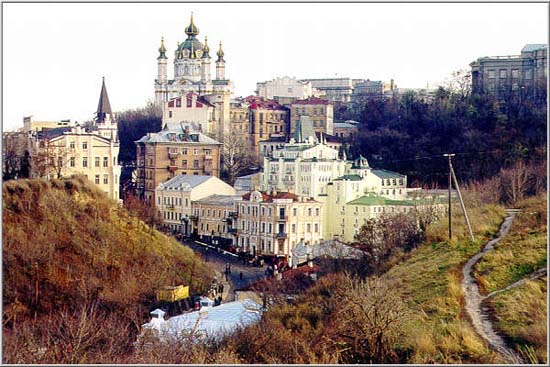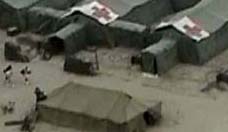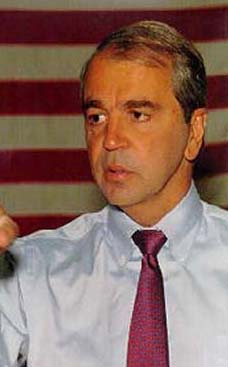
In parts of Eastern Europe - where 6 million of that total live - poverty rates of Roma are between 4 and 10 times that of non-Roma. . To combat such problems, an organization I work with is trying to create educational Roma theater to teach people in the camps about drug abuse and sexually transmitted diseases. Another organization publishes a weekly newspaper for Roma. Yet another works to get them official documents.
Mark Hagengruber says Most Peace Corps volunteers in Ukraine have stories about gypsies, and I have a few more than others.
Roma Realities and Possibilities 2. 8. 2005
UZHGOROD, UKRAINE – Most Peace Corps volunteers in Ukraine have stories about gypsies, and I have a few more than others.
Before coming here 16 months ago and working with some of Uzhgorod's gypsies, I thought of them as romanticized fortunetellers, moving from city to city and earning their keep through music, dance, and - in some cases - thievery. Now, I know them as Roma, their preferred name.
Not all Roma are terribly poor, but that's the perception most Ukrainians have. Many people here see the Roma as the city's janitors. I see them rummaging through my garbage in the summer, sitting in the snow begging for money in the winter, and desperately trying to hold on to their culture.
Almost every time I take my trash to one of the overflowing bins near my old Soviet-style apartment bloc, a Roma in tattered clothes will take the bag from my hand. Anything good goes into a cart teeming with scrap metal and cardboard, pulled by a tired old horse.
"They choose to live that way," a Ukrainian once told me. And if there's too much trash in the streets, another said, "The gypsies aren't doing their jobs."
Nearly a millennium after emigrating from India, the Roma are the secret untouchables of Eastern Europe. Their plight, which is gaining increasing attention, is a significant social issue the region must overcome.
With an estimated population of 7 million to 9 million, Europe's Roma are now "one of the largest, poorest, and fastest growing minorities" on the Continent, according to the World Bank.
And in parts of Eastern Europe - where 6 million of that total live - poverty rates of Roma are between 4 and 10 times that of non-Roma. And in some settlements, Roma unemployment rates are nearly 100 percent. What's more, an estimated 3 in 4 Roma have not completed primary school, and fewer than 1 percent go on to higher education, the World Bank reports.
In February, a "Decade of Roma Inclusion" (2005-2015) was launched by prime ministers from eight central and southeastern European countries, with support from numerous international groups.
The initiative will bring together government officials, Roma leaders, and civil society to improve Roma's condition in the region.
As these countries, including two of Ukraine's neighbors - Slovakia and Hungary - work to improve the situation of their significant Roma populations, how will Ukraine, which was not a part of the initiative, respond?
Here and in other countries, Roma are at the bottom of society. That means doing the most to survive, including - in some cases - pulling scams and stealing. So though most people's prejudice against Roma is backed by anecdotal evidence, in many cases it is attached by association.
My own perceptions of Roma have changed - I bristle now when someone cracks a joke about them. But I still make sure my backpack is closed tightly when I walk past a group of Roma kids. I'd like to go deeper into Roma culture, but getting in is a difficult task itself. Outsiders are either not trusted or are seen as a source of money. Infighting among different Roma ethnic groups keeps them from helping each other.
In Uzhgorod, the Roma live hard lives, often completely off the books because they lack official documents and are wary of the government in general. They move often. Bands of kids spend their days in the center of town, begging and chasing after stray dogs.
I once saw a Roma kid, racing down the street with his friends, stop and check a trash bin. Inside, he found an empty yogurt cup, which he licked clean and threw back in the trash. It was a hot August day.
There are dozens of Roma camps in the area, rampant with contagious diseases. Illiteracy and drugs also abound.
To combat such problems, an organization I work with is trying to create educational Roma theater to teach people in the camps about drug abuse and sexually transmitted diseases. Another organization publishes a weekly newspaper for Roma. Yet another works to get them official documents.
The EU seems focused on improving the lot of the Roma. Will Ukraine, with a new presidential administration and an eye on eventual EU membership, follow this lead as it seeks EU membership?
The first step should be to develop cooperation. Government agencies and nonprofits must reach out to the Roma with offers of help.
The Roma must organize and coordinate their efforts, proving to the rest of Ukraine that they are ready to participate fully in civil society.
Both sides must learn to trust each other. It will take reputable organizations like those in Uzhgorod, with their modest theater projects and advocacy work, to ensure that the Roma of Ukraine aren't left behind as the EU moves forward. Whether life will improve for the Roma remains to be seen, but frankly, it can't get much worse.
(Christian Science Monitor, by Mark Hagengruber)











